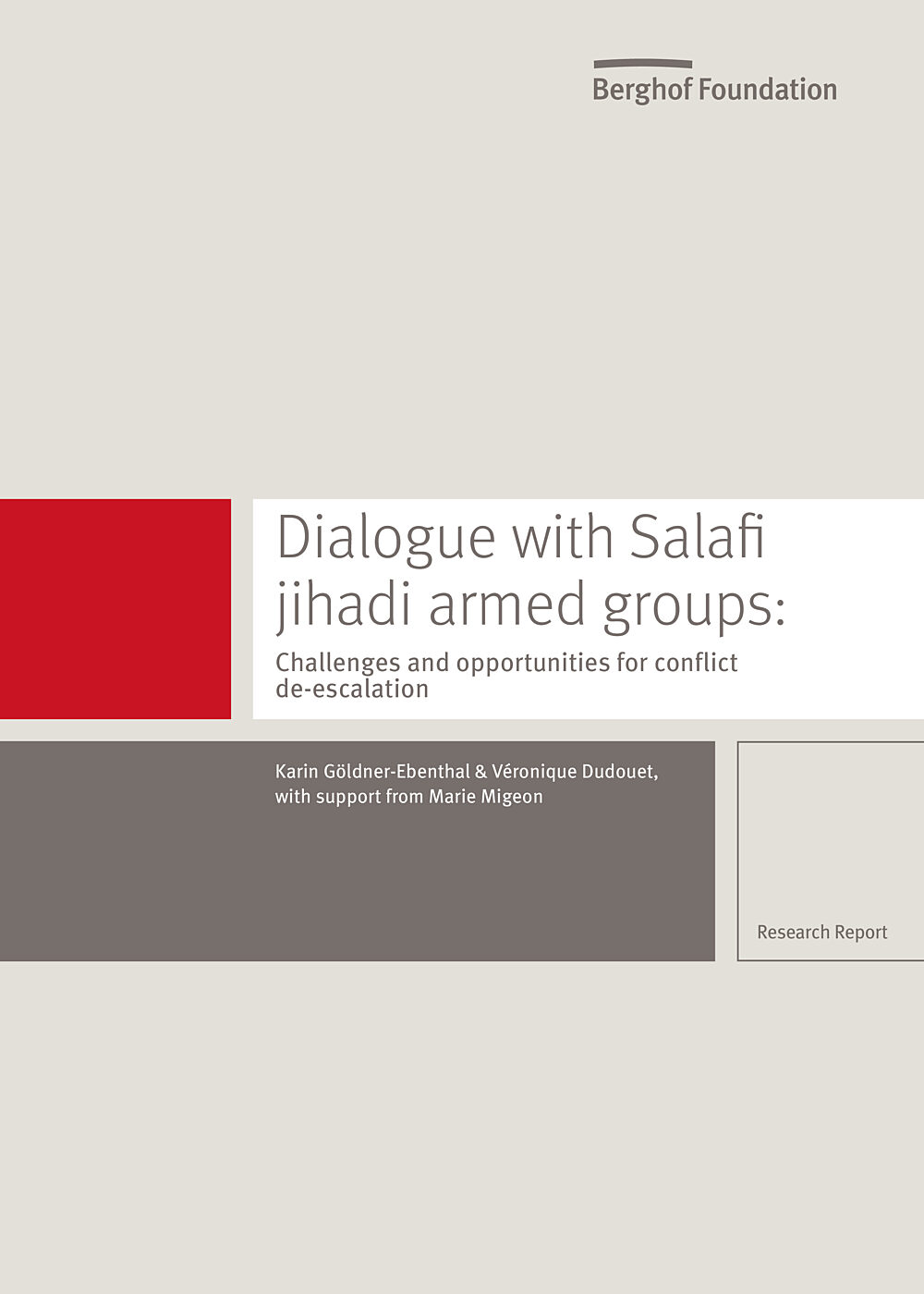PRESS RELEASE | 11 Dec 2019
To de-escalate violent conflicts around the world, it is time to engage in dialogue with Salafi-Jihadi Armed Groups
Governments and the international community can no longer afford to pretend that peace negotiations with Salafi-Jihadi Armed Groups are fundamentally impossible.

Governments and the international community can no longer afford to pretend that peace negotiations with Salafi-Jihadi Armed Groups are fundamentally impossible and deny any debate. Instead, concrete consideration should be given to how and when they are possible and what it takes on the part of governments and the international community to make them successful, a new study by the Berghof Foundation finds.
The Berghof Foundation has been working on de-escalating violent conflicts around the world for close to five decades. This new report is the result of two years of exploratory research with 118 interviews on Salafi-Jihadi Armed Groups (SJAG) and studies on three current or recent cases: Ahrar al-Shams in Syria, al-Shabaab in Somalia and Ansar Dine in Mali.
The report debunks a number of myths and deconstructs many prevalent policy assumptions surrounding Islamist violent extremism.
Not dissimilar to other armed groups
Due to their extreme ideology and brutal killings of opponents, SJAGs are usually described by politicians, the media and academia as a separate category to other armed groups. Yet, the research shows that SJAGs are not as different as they are portrayed. SJAGs’ perceived special features, such as their international networks, are often not unusual in comparison. This is especially true for the ideology, which is largely irrelevant to de-escalation trajectories. However, what is of crucial importance are the relations to the local population. A strong social push back against a group’s use of violence could increase the pressure for it to engage in dialogue.
While most SJAGs typically displayed similar traits, such as transnational aims, anti-democratic tendencies and large religious-ideological overlap, there is also considerable diversity among the groups. Ahrar al-Sham in Syria or al-Shabaab in Somalia have less in common than often claimed. Therefore, a clear individual analysis should be in the foreground in order to find pathways to de-escalate violence.
It is blatantly clear that military might cannot defeat Salafi-Jihadi Armed Groups in the long-run. Dialogue and negotiation are vital for conflict resolution.
Véronique Dudouet, report co-author
Changes in attitudes needed for violence reduction and peace efforts to have a chance
“It is blatantly clear that military might cannot defeat Salafi-Jihadi Armed Groups in the long-run. Dialogue and negotiation are vital for conflict resolution. Governments and the international community must finally realise that political conflicts require political solutions. Fear of negative public reactions should no longer be used as an excuse not to engage in peace efforts. The suffering and devastation caused by violent conflict are too big to continue turning a blind eye,” said Véronique Dudouet, the Berghof Foundation’s Programme Director for Conflict Transformation Research and co-author of this report.
Research on the three case studies in Mali, Somalia and Syria revealed a wealth of forms and actors of dialogue have taken place over the past years pointing to a degree of openness to talks. Yet, most dialogues were conducted by humanitarian NGOs and were not of a political nature. In Mali and Somalia for example, SJAGs such as Ansar Dine and al-Shabaab have been engaging regularly, and mostly through local entry points, with humanitarian actors – such as the International Committee of the Red Cross or Doctors without Borders – for aid delivery.
As with other armed groups, political dialogue processes should start without any preconditions, such as laying down arms. Challenging the ideological narrative of SJAGs to delegitimise their religious claims can be particularly dangerous, as that could increase resistance and increase mistrust towards dialogue offers. It is not realistic to expect actors to de-radicalise as a precondition for any engagement in dialogue. Once ongoing, however, dialogue engagement can trigger internal negotiation processes and encourage the moderates and pragmatists to prevail against the hardliners.
In Syria, dialogue outreach to political representatives from Ahrar al-Sham incentivised their increasing engagement in international negotiations, notably in Riyadh (2015) and Astana (2017). However, these talks proved to be a missed window of opportunity as the group became increasingly divided and eventually split in 2017 under the strain of peer pressure, strategic dilemmas and military hardship.
It takes two to tango. Both SJAGs and the governments need to change their attitudes towards dialogue and negotiations.
Karin Göldner-Ebenthal, report co-author
“It takes two to tango. Both SJAGs and the governments need to change their attitudes towards dialogue and negotiations. SJAGs need to formulate clearer political goals and abstain from maximalist demands, which are not negotiable and too unspecific. In turn, the governments cannot conduct successful negotiations, as long as they label SJAGs as ‘irrational terrorists’ with whom no dialogue is possible. Otherwise, opposition by the population will be too big and mistrust by the SJAGs too high to engage with the government. The way to negotiations is long, but even slow processes have to start somewhere,” said Karin Göldner-Ebenthal, co-author of the report.
Notes to the editor: The full report can be downloaded here along with case studies on Mali, Somalia and Syria.
Media contact
You can reach the press team at:
+49 (0) 177 7052758
email hidden; JavaScript is required


